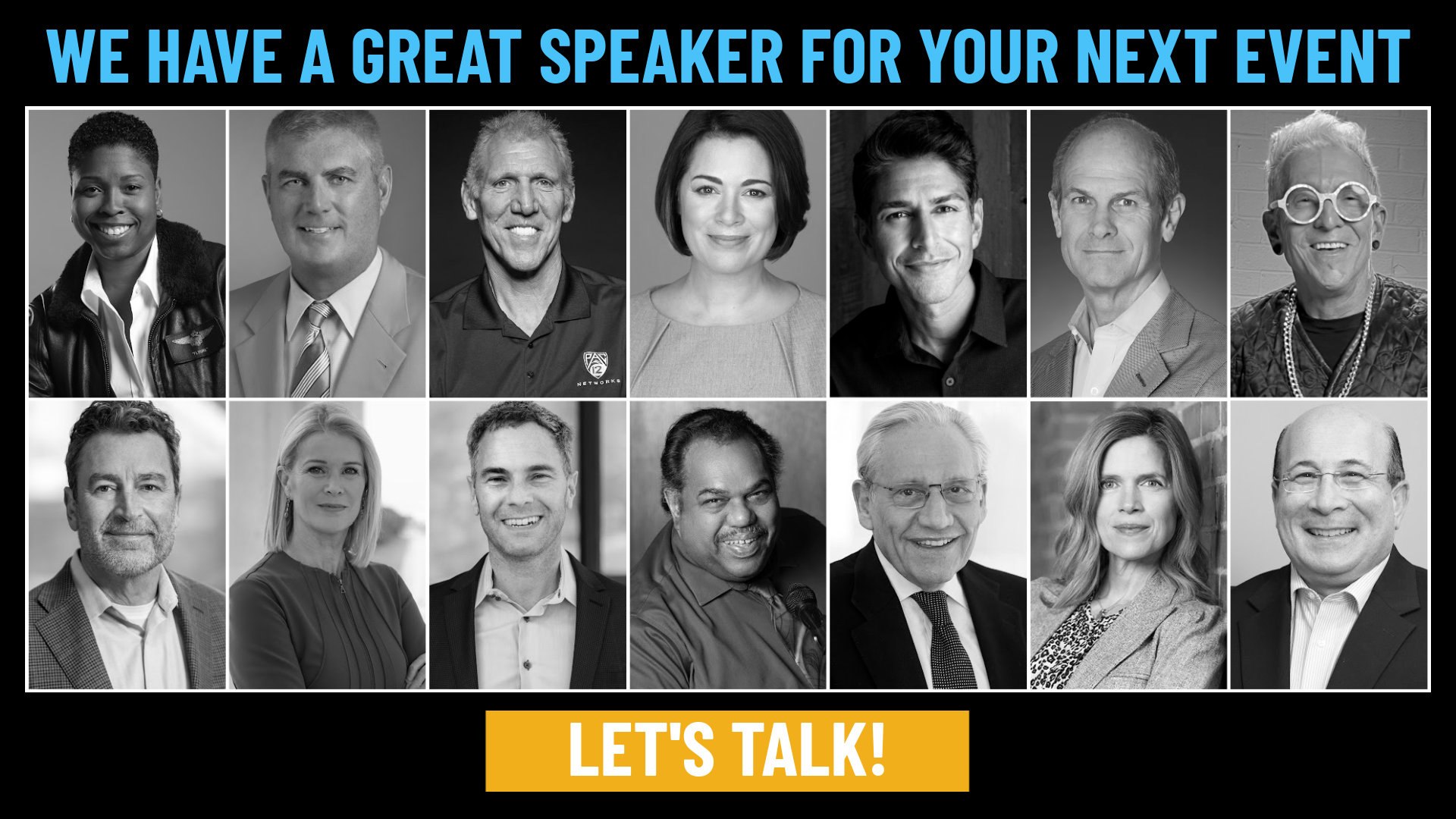Event planner career pivot: Could you be a speakers' bureau agent?
A career as a speakers' bureau agent
After 40+ years as an agent, first in the music business and then for top speakers, I made a career change in 2012 and began managing a carefully chosen group of top experts who speak. In my new life, I work with most every speakers’ bureau on a daily basis. They often ask me, especially now when talent is so hard to find if I know someone who'd make a great agent. Sometimes I do – and I do my best to connect people and help however I can.
There is an unquestionable demand for really good people to come into the speaking industry. One thing the pandemic has done is to show everyone the power and possibility of virtual events. I know that the idea of one more Zoom meeting is not appealing, but as in-person events return, virtual gatherings will absolutely have their place, given new organizational designs evolving in the new world of work. I believe there is a boom coming to the speaking industry the likes of which we haven’t seen in years.
In the throes of the so-called Great Resignation, you might be considering a change. Perhaps you’ve even looked at the speaking industry and thought, “As career choices go, that would be really interesting; I wonder what it would take to do that job?” That led me to consider: what makes a good speakers’ agent; what skills and traits are fundamental to success?
Over the years, I’ve hired and weighed in on hiring, dozens of people for agent positions. Some decisions were good – many were not. In some cases, those who didn’t make it were people I was absolutely convinced would be successful. I’ve struggled to understand why in an effort to make better choices for all concerned.
Want to learn more about
D'AMELIO NETWORK speakers for your next event?
What makes a good speakers’ agent? I asked that question to top people at several major speakers’ bureaus. All have wrestled with this same question. Their observations and advice appear throughout this article. The answer isn’t quite so simple because people’s perception depends on their place in the industry, meaning that the industry looks very different for agents in one company vs. another. The industry is deceptively different on so many levels. I’ll explain what I mean in a minute.
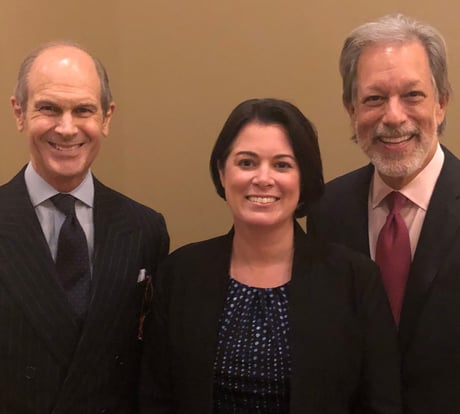
With Fortune's GEOFF COLVIN and 21-year USAF fighter pilot NICOLE MALACHOWSKI
THAT looks like a fun job!
Let’s get this one out of the way at the very beginning: people say to me and industry colleagues all the time, “Your job looks like so much fun!” This industry offers a unique opportunity to keep engaged in the world in the way few other careers can match. I absolutely love my work. It has its fun moments – but for me, it’s a rewarding feeling to be part of the effort that brings new ideas to audiences. I’ve seen how the right speaker can change people’s minds, careers, and lives.
This industry has afforded me an amazing education. I’ve been at events with some of the world’s top leaders - President Reagan, Margaret Thatcher, Colin Powell, Condoleezza Rice, Tony Blair, Alan Greenspan, George Bush, and others – and to hear the off-the-record conversations has helped me understand the world in new ways. The industry has given me the chance to work closely with achievers of every description – from business, sports, media, politics, personal growth/motivation, and the arts – these opportunities showed me that the sky IS the limit and that what we make of our lives is a choice – attitude is so important.
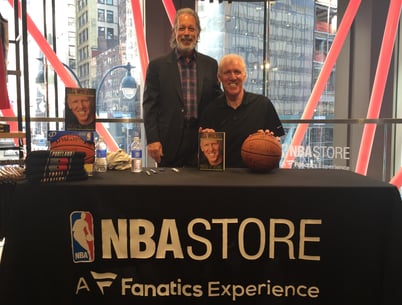
A fun moment: in NYC to launch BILL WALTON's autobiography, "Back from the Dead"
So yes, the job has been a life-changer for me – an absolute privilege. But ultimately, when done well, the job is about knowing the available talent, listening carefully to what needs to be accomplished, and recommending the perfect choice to help a company, association, or organization achieve a specific outcome. Hard work defines the job.
A variety of business models
Whether it’s working as an agent (actually representing the talent) or acting as a broker (and working with no one exclusively) - there are a variety of business models in the speaking industry. The essence of what you need to do the job well is pretty much the same, though actually representing the talent exclusively arguably adds another level of responsibility, accountability, and stress – that’s different from the model that doesn’t answer broadly to the talent they work with.
More than a career – a lifestyle
For the best agents in this industry, it’s not a career – it’s a lifestyle. The speakers and talent that agents work with are on television, in movies, in publications, in the news, etc. all the time. Plus, as the world changes, what an audience wants to hear and learn from someone may well change, too. The business environment is a perfect example. Covid completely altered the way companies work and the competitive marketplace. As the economy reacted to those changes, audiences craved different insights and information. The best business and economic speakers essentially reframed their speech offerings to match what audiences were looking for. Event planners rely on speakers’ agents and brokers to help them navigate all myriad of choices. In the end, the best speaker bureau pros make their buyers look brilliant…to their bosses, to the audience, and to other event stakeholders.
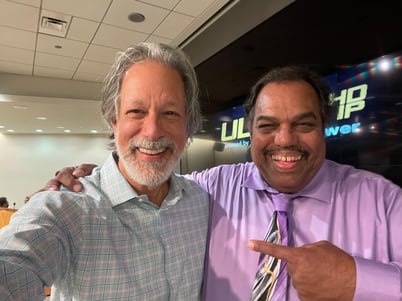 With Internationally Acclaimed Conflict Navigator DARYL DAVIS
With Internationally Acclaimed Conflict Navigator DARYL DAVIS
Success begins with staying informed
Keeping informed is a vital part of being able to recommend the right speakers to people who are planning events. When I would interview people for an agent job, I’d ask them how they stayed kept up with what’s going on in the world. Their answer told me a lot about whether they might succeed.
For people who were pre-disposed to being well-informed – reading newspapers, magazines, and online sources as part of their normal life – those people didn’t find it overwhelming to keep up with the kind of information they’d need to recommend the right speaker.
For others, the idea that they had to keep up with the news, pop culture, business, etc. because it was part of the job was a chore. Those people struggled. Staying informed felt like work in itself and they didn’t enjoy it. Moreover, they simply couldn’t internalize what they needed to know to be a great resource for those they served.
The best speaking industry pros will lead their clients. To do that, it’s what’s in-between the agent or broker’s ears that’s actually their most important asset.
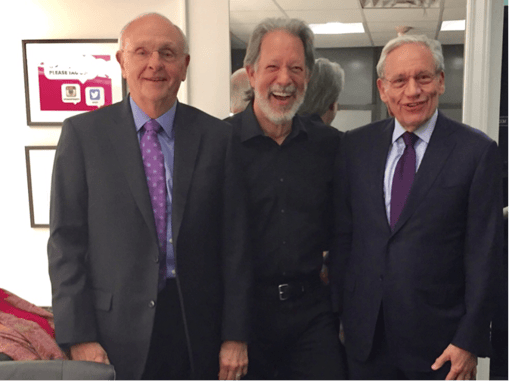
Backstage at the 92nd Street Y in NYC with BERNIE SWAIN (left), founder of Washington Speakers Bureau and BOB WOODWARD (right), legendary investigative reporter for The Washington Post
Ultimately UN-glamorous
Success in this business, like any kind of sales role, comes with a routine. Those people who can, as they say, “plan their work and work their plan,” can meet with great success. There’s a methodical aspect to doing this work – and those who have that sense, do best.
Not a 9-5 job
But then again, most jobs aren’t these days. In this case, there can be lots of moving parts – jets, cars, hotels, last-minute changes…and if things go off the rails, you have to be around to support the speaker or event planner when they need it. It’s just part of the job.
Is there a good background for joining the industry?
You'd think meeting planners, or a hotel background, or people who've been successful in sales would be perfectly suited for this industry. I thought so, too. Over my years in the industry, I've hired people with such backgrounds. The success rate was about the same as from other random backgrounds. Career background didn’t necessarily portend success in the speaking industry.
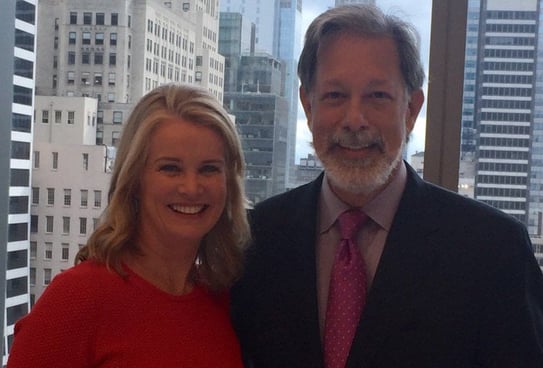
With Award-winning Journalist and Anchor KATTY KAY
What’s it take? Skills and traits.
So, let’s get down to it – what skills do you need to do this job really well? I put the question out to seven people in top leadership at North American bureaus. There was much agreement about one idea: the skill set of a top agent is rare. That said, there really is no one skill set. Personally, I’ve worked with people who were really great at the job, yet the way they did the work was very different from their successful contemporaries. So, it’s more like there’s an array of skills and traits that define those who really succeed in the lecture industry. The list below incorporates my own observations and the best of what others shared with me. Here we go.
The most successful speaking industry professionals . . .
- Don’t do it for the money…yes they can make a great living, but that’s not what drives them and people who work with them sense that. It fosters trust.
- Are disciplined…the best agents I’ve seen are the ones who come to work every day and do the heavy lifting. They’re focused on input, not output. They do their 20-mile march, get their calls done. They succeed through discipline and routine, not charisma and charm. It’s not exciting or sexy, but it works.
-
Constantly re-prioritize…I asked a job applicant once how they planned to approach the job. They opened up their notebook to reveal a grid where every minute was filled with activity. They had over-planned. I asked, suppose you come in and something happens and you can’t get any of that stuff done? I got a blank stare back. The truth is, there are many days that just take on a life of their own – and you do what you must to assess priorities and adjust accordingly. In spite of that “plan your work . . .” thing, you have to know how to riff, too.
- Have a sense of responsibility…they are successful because they’ve proven they can be depended upon.
- Watch the details…there are SO many moving parts it’s easy to get overwhelmed. Little things matter and the best agents have figured out a system of keeping it all straight. Everyone does it their own way – but they ALL do it.
- Have an insatiable curiosity. We’re exposed to so many great ideas every day. Curious people make time to absorb those ideas. The value of that is the ability to pull seemingly irrelevant information out at the right moment and connect the dots – to help an event planner understand why a particular speaker or topic would be perfect for their audience. This is a great career for people who love to continue learning.
- Are storytellers…just like the people they are recommending.
- Have a strong moral compass in an industry that can be famous for ethical lapses.
- Form strong relationships with those they serve, not transactional ones… which means calling them when it is NOT in their sales cycle. I would also add in the importance of communication, service, “deal-structuring/partnership/negotiation”, commitment, values, discipline, and work ethic.
- Never take “no” for an answer. They nicely circle back and offer more creative ideas. They recognize that buying a speaker is fraught with fear and the biggest role is to provide reassurance to event planners that they are making the right choice. Of course, they always have the best interests of the event planner at heart.
- Have patience…a great agent builds relationships based on a foundation of trust, and trust takes time to develop. I think it’s critical to take a long view and look at each opportunity to connect with a client or prospective client as an opportunity to add value, build credibility and ultimately develop trust.
- Have empathy…I think to be a great agent, you need to be able to step into your client's shoes, and see things from their perspective. It’s not so much about who you think the best speakers are. It’s about understanding the needs of your clients and recommending the best speakers for them.
- Are curators of ideas…it’s a rapidly changing world and while you can’t know everything, the best agents know about the things that will interest their clients. After all, it’s possible that one minute you’re helping someone find the right speaker on artificial intelligence; the next arranging the perfect sports figure to inspire an audience; and the next offering recommendations for an after-dinner comic. The sheer breadth of expertise it takes to do this is pretty remarkable, yet the best agents make it look effortless. It’s not. It’s a huge challenge to keep current on talent out there to serve your clients.
- Know what they need to know…one bureau owner told me it’s not about being the smartest person in the room. It’s about knowing enough to make the right recommendations. You don’t have to be the expert – the speakers do that. Don’t get wrapped around the axel.
- Are great communicators and creative in the way they offer recommendations and package the financial aspects of any deal.
- Are driven. They set their own goals (usually surpassing those that the company sets for them). With how challenging the job can be at times, it’s the inner drive to succeed, the determination to make this year better than last year, and the commitment to building strong relationships that differentiate people who are at the top of this profession.
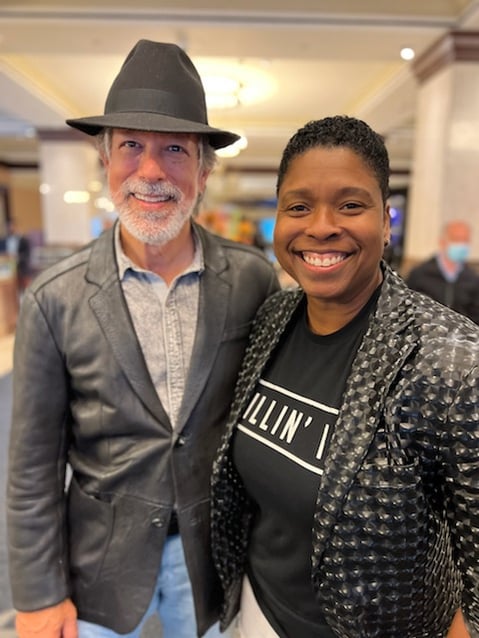
With America's First Black Female Combat Pilot VERNICE "FLYGIRL" ARMOUR
Is the lecture industry for you?
If you’ve read all this and think it might be a career you'd enjoy, talk with someone you know in the business – or check out the website for the industry association, the International Association of Speakers Bureaus – www.iasbweb.org. I can tell you this for certain: this is among the most fascinating and rewarding of career choices you can make.
About Tony D'Amelio
Tony has spent his career putting talented people and audiences together, first in the music business and later representing the world's leading speakers. After concluding 27 years as Executive Vice President of the Washington Speakers Bureau, Tony launched D'Amelio Network, a boutique firm that manages the speaking activities of a select group of experts on business, management, politics and current events. Clients include: Mike Abrashoff, Mariana Atencio, Chris Barton, Lisa Bodell, Geoff Colvin, Daryl Davis, Suneel Gupta, Ron Insana, Katty Kay, Polly LaBarre, Nicole Malachowski, Ken Schmidt, and Bob Woodward.

.png)
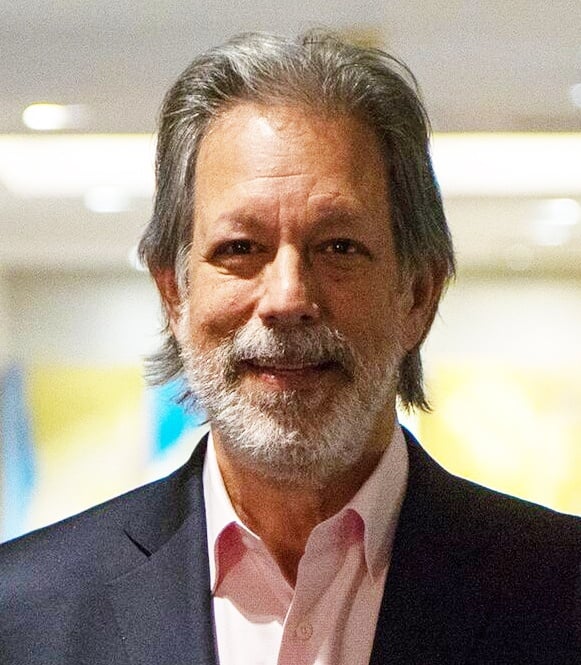
.jpg)

